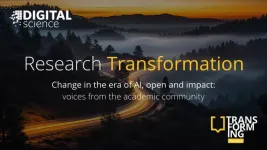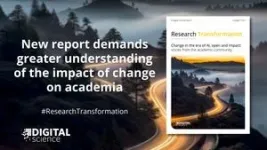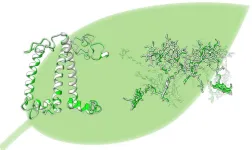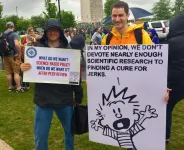(Press-News.org) Digital Science, a technology company serving stakeholders across the research ecosystem, is today calling for greater awareness of the impact that a myriad of fast-developing technologies are having on academics and their institutions.
This follows the publication of a new report from Digital Science looking at how changing attitudes and behaviors towards research are affecting traditional research models and dynamics. Key themes to emerge from the findings relate to areas of open research, impact and evaluation, tech and AI, collaboration and research security.
The objective of the report – titled Research Transformation: Change in the era of AI, open and impact – was to learn more about how the research world is experiencing transformation, what’s influencing change and how roles within it are being impacted. Digital Science conducted a survey, reaching out to the research community through questionnaires and in-depth interviews.
Findings from the report may make sobering reading for those involved in academia, as the lightning pace of technological change appears at odds with the traditionally slow-moving nature of the research ecosystem. In total there are five key takeaways:
Open research is transforming research, but barriers remain
Research metrics are evolving to emphasize holistic impact and inclusivity
AI’s transformative potential is huge, but bureaucracy and skill gaps threaten progress
Collaboration is booming, amid increasing concerns over funding and security
Security and risk management need a strategic and cultural overhaul
Digital Science’s new Executive Vice President of Academic, Jonathan Breeze, says: “The Research Transformation: Change in the era of AI, open and impact report gives a voice to the opinions of the academic community and their feelings about changes in the research ecosystem. Importantly, the report gives the whole sector a deeper understanding of the fast-changing needs of academia.
“The report explores how academic roles are evolving, the external drivers of change, and future predictions. It also looks at how Digital Science can support the sector’s changing needs through AI-powered tools and innovations, which is something we’re paying very close attention to across our organization.”
Commenting on the findings, Digital Science’s Mark Hahnel, VP Open Research, and Simon Porter, VP of Research Futures, say: “Our report speaks loudly of the technological advancements, new research practices and global problems driving change in academia. These transformations have created both opportunities and obstacles for institutions and the sector at large.
“Reflecting on the findings, we believe academic institutions can position themselves to deliver meaningful research in the era of three key developments – AI, open research and research impact.”
The report’s findings are based on survey analysis, plus insights from in-depth interviews. The survey was an online questionnaire of open and closed questions that ran during 29 May-12 July 2024 with a total of 380 respondents from 70 countries. Typically, respondents held roles within the academic library, research office, faculty and leadership teams. Further in-depth interviews were held with 15 participants from the academic community over the summer of 2024.
Following the publication of the report, there are also several other activities including a webinar hosted in partnership with Times Higher Education. This webinar will feature a panel discussion on the evolving role of research in academia and the transformative impact of AI and other emerging technologies in making research more open, inclusive, and collaborative.
See the full report here: digital-science.com/academic-research-transformation
For more details on Digital Science and its solutions for academic institutions, visit our website: digital-science.com/academic
About Digital Science
Digital Science is an AI-focused technology company providing innovative solutions to complex challenges faced by researchers, universities, funders, industry and publishers. We work in partnership to advance global research for the benefit of society. Through our brands – Altmetric, Dimensions, Figshare, IFI CLAIMS Patent Services, metaphacts, OntoChem, Overleaf, ReadCube, Scismic, Symplectic, and Writefull – we believe when we solve problems together, we drive progress for all. Visit www.digital-science.com and follow @digitalsci on X or on LinkedIn.
Media contacts
Simon Linacre, Head of Content, Brand & Press, Digital Science: Mobile +44 7484 381477, s.linacre@digital-science.com
David Ellis, Press, PR & Social Manager, Digital Science: Mobile +61 447 783 023, d.ellis@digital-science.com
END
New report demands greater understanding of the impact of change on academia
2024-10-28
ELSE PRESS RELEASES FROM THIS DATE:
Discovery of key mechanism in Huntington’s Disease could pave the way for early detection and treatment
2024-10-28
Researchers from the University of Oxford have identified a key biochemical mechanism relevant to the development of Huntington’s Disease. This discovery opens up the possibility of studying the disease before its clinical onset and eventually stopping its progression.
The study, published in Nature Metabolism, has shown for the first time the biochemical change responsible for the development of Huntington’s disease, and how blocking this change stopped disease progression.
Huntington's disease is an inherited condition that stops parts of the brain from working properly, leading to mental and physical decline that slowly ...
Humans and AI: Do they work better together or alone?
2024-10-28
The potential of human-AI collaboration has captured our imagination: a future where human creativity and AI's analytical power combine to make critical decisions and solve complex problems. But new research from the MIT Center for Collective Intelligence (CCI) suggests this vision may be much more nuanced than we once thought.
Published today in Nature Human Behaviour, “When Combinations of Humans and AI Are Useful” is the first large-scale meta-analysis conducted to better understand when human-AI combinations are useful in task completion, and when they are not. Surprisingly, the research has found that combining humans and AI to ...
Childhood attention issues and genetic factors may predict psychosis risk
2024-10-28
Researchers at UCLA Health have found that a person's risk of developing psychotic-like experiences may be influenced by both childhood attention problems and their genetic makeup.
The findings, published in Nature Mental Health, build upon a long-studied association between childhood attention problems and the likelihood of later developing schizophrenia. Using data from about 10,000 children over six years, UCLA researchers led by Dr. Carrie Bearden sought to determine how attentional variability ...
Amsterdam UMC study proves impact of rapid first shock after cardiac arrest
2024-10-28
It is well known that acting quickly in the event of a cardiac arrest is important, but what does a quick initial shock with a defibrillator mean exactly for patients' chances of survival? Researchers from Amsterdam UMC analysed the data of 3723 patients who had a cardiac arrest outside the hospital and concluded that for the first shock, every minute reduces the chance of survival by 6%. The results of this research were published today in the international journal Circulation.
"Our research shows that every minute of delay in giving the first shock has a major impact. If the first shock was given within six minutes, it was possible ...
Children’s BMI can affect their future lung function
2024-10-28
An abnormal BMI in children – be it high or low – can now be associated with impaired lung function, but if their BMI is normalised before they reach adulthood, the impairment can be offset, researchers from Karolinska Institutet report. Their results, which are based on data collected under the BAMSE project in Sweden, are presented in The European Respiratory Journal.
One in ten people have reduced lung function development in childhood and cannot achieve maximal lung capacity in adulthood, increasing the risk of serious health problems such as cardiovascular disease, lung disease and diabetes. One risk factor associated with impaired lung function development is abnormal ...
Don't worry. Study shows you're likely a more creative writer than ChatGPT. For now
2024-10-28
Imagine you decide to write a short story about a protagonist who creates an artificial human and then falls in love with it. What gender is your protagonist? What about the artificial human? Would you write a moving love story? A cautionary dystopian tale?
Would your story be more compelling than one written by ChatGPT?
Likely yes, says Nina Beguš, a researcher and lecturer in UC Berkeley's School of Information and Department of History. Leveraging her background in comparative literature ...
Heart failure mortality declining in Sweden
2024-10-28
A new study from Karolinska Institutet shows that heart failure mortality has decreased in Sweden over the last 20 years. The study has been published in the European Journal of Heart Failure.
A national study has shown that heart failure mortality has decreased in Sweden over the last two decades. Despite these improvements, the prognosis for heart failure patients remains worrying – 25 percent of those diagnosed in 2022 died within a year.
“Our results suggest that advances in heart failure treatment over the past decades have reduced heart failure mortality, both at the population level and for individual patients. ...
Understanding how mutations affect diseases
2024-10-28
Many statistical models and algorithms used by scientists can be imagined as a “black box.” These models are powerful tools that give accurate predictions, but their internal workings are not easily interpretable or understood. In an era dominated by deep learning, where an ever-increasing amount of data can be processed, Natália Ružičková, a physicist and PhD student at the Institute of Science and Technology Austria (ISTA), chose to take a step back. At least in the context of genomic ...
Quality control in artificial photosynthesis: validating natural antenna mimicry
2024-10-28
Humans can do plenty, but plants have an ability we don’t: they make energy straight from sunlight, a superpower called photosynthesis. Yet new research shows that scientists are closing that gap.
Osaka Metropolitan University researchers have revealed the 3D structure of an artificial photosynthetic antenna protein complex, known as light-harvesting complex II (LHCII), and demonstrated that the artificial LHCII closely mirrors its natural counterpart. This discovery marks a significant step forward in understanding how plants harvest and manage solar energy, paving the way for future innovations in artificial ...
When science speaks in extremes
2024-10-28
“Vaccines are 100% safe, and anyone who doubts this is ignorant”: Have you ever come across messages like this during the pandemic crisis a few years ago? If you often feel that certain public debates—such as those on vaccines or the climate crisis—boil down to a black-and-white clash between two sides demanding, with harsh tones, unquestioning allegiance to their view, you're not entirely wrong. We are rightly accustomed to being warned about pseudoscientific misinformation and fake news, and much research has been devoted ...






